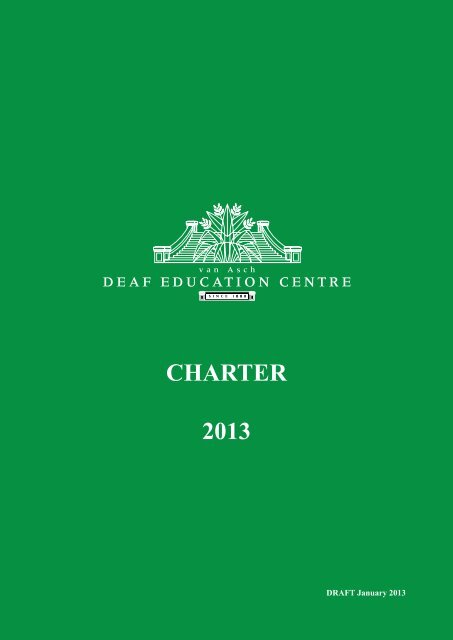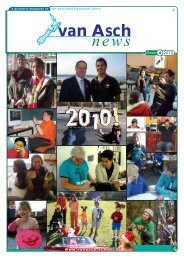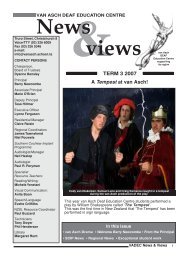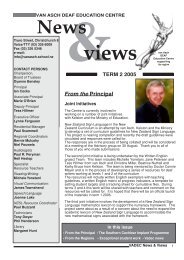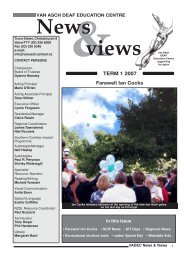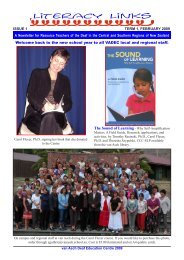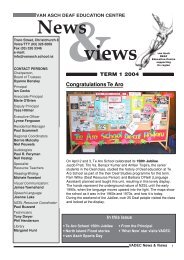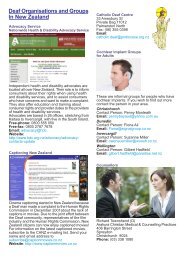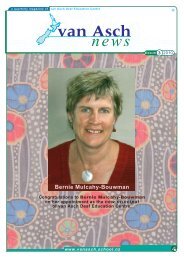CHARTER 2013 - Van Asch Deaf Education Centre
CHARTER 2013 - Van Asch Deaf Education Centre
CHARTER 2013 - Van Asch Deaf Education Centre
Create successful ePaper yourself
Turn your PDF publications into a flip-book with our unique Google optimized e-Paper software.
<strong>CHARTER</strong><strong>2013</strong>DRAFT January <strong>2013</strong>
INDEXMission Statement ......................................................................................................................3Vision...........................................................................................................................................3Core Business..............................................................................................................................3Maori Student Achievement Strategy..........................................................................................3Governance Statement.................................................................................................................4National Standards.......................................................................................................................4Values..........................................................................................................................................5General Profile of the <strong>Centre</strong>, its Community and its Special Nature.........................................6Description of our students (Base School, Satellite Classes, Early Intervention).......................9Enrolment Procedure...................................................................................................................9Strategic Planning......................................................................................................................10Strategic Plan from <strong>2013</strong> - 2015................................................................................................11References - Strategic Plan........................................................................................................12Procedure Self-Review Plan, <strong>2013</strong> - 2015................................................................................13Annual Plan <strong>2013</strong>......................................................................................................................16References - Annual Plan - Operational Goals <strong>2013</strong>.................................................................17van <strong>Asch</strong> <strong>Deaf</strong> <strong>Education</strong> <strong>Centre</strong> Charter <strong>2013</strong> Draft January page 2
INTRODUCTION SECTIONMissionThe Combined Board of van <strong>Asch</strong> <strong>Deaf</strong> <strong>Education</strong> <strong>Centre</strong> and Kelston <strong>Deaf</strong> <strong>Education</strong> <strong>Centre</strong>acknowledges it’s legal obligations and it’s duty of trust care towards deaf students and their families.The van <strong>Asch</strong> <strong>Deaf</strong> <strong>Education</strong> <strong>Centre</strong> Mission States that:The pupose of van <strong>Asch</strong> <strong>Deaf</strong> <strong>Education</strong> <strong>Centre</strong> is to provide high quality educational programmesand special related services which meet the needs of deaf and hearing-impaired studentsand their families and communities.VisionTo enhance learning outcomes for children who are deaf or hearing-impaired.We will do this by:• providing specialist teaching and support services• developing communication skills and language• providing equitable access to learning• providing for successful learningCore BusinessCombined Board of van <strong>Asch</strong> <strong>Deaf</strong> <strong>Education</strong> <strong>Centre</strong> and Kelston <strong>Deaf</strong> <strong>Education</strong> <strong>Centre</strong> acknowledgesthese guiding documents. Each describes some aspect of the school system’s principles, values anddesirable achievements with particular emphasis on deaf students.• the National <strong>Education</strong> Guidelines• the National Plan for <strong>Deaf</strong> <strong>Education</strong>• the New Zealand Disability Strategy and• UN Conventions on the Rights of Disabled People and the Rights of ChildrenMaori Student Achievement StrategyIn recognising the unique position of Maori culture and language in New Zealand, van <strong>Asch</strong> <strong>Deaf</strong><strong>Education</strong> <strong>Centre</strong> continues to enhance procedures and practices within all aspects of the <strong>Centre</strong> toraise achievement for Maori students.Through professional leadership and training, teaching and residential staff are reflecting onculturally responsive practices to engage the Maori Learner .All Core School students including Maori will be provided with opportunities to take part in MaoriTikanga, Te Reo and Maori Art activities.In <strong>2013</strong> a newly appointed Maori Cultural Adviser/Kaitakawaenga will support learningopportunities in the Core School and support engagement and consultation with Maori familiesacross the van <strong>Asch</strong> Region.van <strong>Asch</strong> <strong>Deaf</strong> <strong>Education</strong> <strong>Centre</strong> Charter <strong>2013</strong> Draft January page 3
INTRODUCTION SECTIONGovernance StatementForming the Combined Board:In May 2012 Minister of <strong>Education</strong> informed the KDEC Board of her decision to enact a governanceproposal that would “result in a single board of trustees governing two schools”.On October 4th 2012, New Zealand Gazette notice 6366/2012 created a Combined Board of Kelston <strong>Deaf</strong><strong>Education</strong> <strong>Centre</strong> and <strong>Van</strong> <strong>Asch</strong> <strong>Deaf</strong> <strong>Education</strong> <strong>Centre</strong>. The constitution of the combined Board includesthe election of six parent representatives, a staff trustee and two student trustees, as well as the Principalsof the two <strong>Deaf</strong> <strong>Education</strong> <strong>Centre</strong>s. The combined Board has the discretion to coopt up to four moretrustees.In welcoming the new Board at Parliament in December 2012 the <strong>Education</strong> Minister Hekia Parata statedthat the formation of a combined Board of Trustees for Kelston <strong>Deaf</strong> <strong>Education</strong> <strong>Centre</strong> and van <strong>Asch</strong> <strong>Deaf</strong><strong>Education</strong> <strong>Centre</strong> marks a significant step towards providing a nationally consistent service for learnerswho are deaf or hearing impaired. The formation of the new Board will combine each <strong>Centre</strong>’s strengthsand provide unified governance for the two <strong>Deaf</strong> <strong>Education</strong> <strong>Centre</strong>s.According to the Minister’s original proposal the formation of the combined board would not resultin any immediate change to each school or to staff. The Ministers (Tolley and Parata) did howeverpresent their view that six drivers for improvement were at stake. The Combined Board is committed toexploring these drivers as they development their strategic plan:1. Increase opportunities for communication and sharing knowledge and skills between the <strong>Deaf</strong><strong>Education</strong> <strong>Centre</strong>s2. Allow for flexible use of resourcing to meet demographic changes in the deaf and hearingimpaired student population3. Maximise the Review of Special <strong>Education</strong> initiative for sensory schools to provide more flexibleservices for ORS verified students4. Set a national approach to service provision5. Ensure perspectives of the key stakeholders are represented well6. Assure governance arrangements best suit the service provider roles of the <strong>Deaf</strong> <strong>Education</strong><strong>Centre</strong>sNational StandardsNational Standards will not provide appropriate benchmarks of progress and achievement for deafstudents enrolled at the base school due to their significant literacy, numeracy and language delays.These students are either at the foundation level or are likely to learn long term within level 1 of the NewZealand Curriculum.IEPs will be used to agree on learning goals and for reporting progress to families and whānau.National Standards plus <strong>Deaf</strong> <strong>Education</strong> assessment and development exemplars in reading, writing andnumeracy in the early years of schooling will be used as a guide to set communication and literacy goalsfor those students functioning at this level within the IEP.van <strong>Asch</strong> <strong>Deaf</strong> <strong>Education</strong> <strong>Centre</strong> Charter <strong>2013</strong> Draft January page 4
Valuesvan <strong>Asch</strong> <strong>Deaf</strong> <strong>Education</strong> <strong>Centre</strong>Va l u e sRIDEPPRIDEPride inRespect forIntegrity<strong>Deaf</strong> CultureExcellencevan <strong>Asch</strong> <strong>Deaf</strong> <strong>Education</strong> <strong>Centre</strong> Charter <strong>2013</strong> Draft January page 5
General Profile of the <strong>Centre</strong>, Its Community and ItsSpecial Naturevan <strong>Asch</strong> <strong>Deaf</strong> <strong>Education</strong> <strong>Centre</strong>, located in Sumner, a suburb of Christchurch and in the Waitahi Iwi, wasestablished in March 1880 as a fully funded Department of <strong>Education</strong> special school.Today, it is both a coeducational composite special school and a national resource centre, havingresponsibility for the support of deaf and hearing-impaired children and students throughout the South Islandand lower half of the North Island.The Annual Resourcing Notice from the Ministry of <strong>Education</strong>provides funding for the <strong>Centre</strong> to provide a range of services.By maintaining regular liaison with the Ministry of <strong>Education</strong>Special <strong>Education</strong> district offices in the area, the <strong>Centre</strong> provides todeaf and hearing-impaired students, parents/caregivers and associatedsupport persons:• audiological services and technical aids• printed and electronic educational resources• professional advice on educational management andprogrammes• resource teachers of the deaf• part-time teacher support programmes and habilitationservices• counselling and guidance services, curriculum development and research support programmes.It also provides a range of on-campus programmes, from preschool through secondary, and makes full use ofthe wide range of resources that are available both in the local district and greater Christchurch area.An Early Intervention <strong>Centre</strong> on-campus programme is provided for local families. The E.I.C. has asessional licence and provides group parent and child sessions. Weekly individual parent-child sessionsare also provided. The <strong>Centre</strong> follows the Te Whaariki Curriculum with an emphasis on communicationdevelopment. The E.I.C is also accessed by families from across the region through PreschoolResidential Courses that are provided throughout the schoolyear. Up to three families can attend each course.Habilitation services for children with cochlear implantsare provided through a contract with the Southern HearingCharitable Trust. Habilitationists are based at the SouthernCochlear Implant Programme at St. George’s Hospital. Theyalso provide an outreach service to children’s home areas.Satellite classes operate at Hagley Community College andWharenui Primary School in Christchurch. Core schoolenrolments come from throughout the region served by the<strong>Centre</strong>.van <strong>Asch</strong> <strong>Deaf</strong> <strong>Education</strong> <strong>Centre</strong> Charter <strong>2013</strong> Draft January page 6
General Profile of the <strong>Centre</strong>, Its Community and ItsSpecial NatureThe <strong>Centre</strong> has residential facilities to cater for those students whose overall personal, social and educationalneeds cannot be met in their home area. They are also used for assessment of students and in-service andtraining programmes for parents/caregivers and associated support persons. Regional students use theresidential facilities when attending Mainstream Immersion courses. When not required for the <strong>Centre</strong>'s ownuse, the facilities are used, on a cost recovery basis, for other education in-service programmes.The <strong>Centre</strong> has well maintained buildings and grounds. Many of the buildings, particularly in the residentialsection, have been constructed since 1980 and there has been progressive upgrading of classrooms. There is awell equipped media centre, which also serves the region, a gymnasium, sealed tennis courts, well- appointedplaying fields, a hall and associated conference facilities, technicraft, audiological assessment and technicalservices facilities, preschool through post-secondary instructional areas and special purpose instructionalrooms.The <strong>Centre</strong>’s Regional Specialist Teaching Service provides teacher support to <strong>Deaf</strong> students in mainstreamand unit settings. There are approximately 400 deaf and hearing-impaired students in mainstream settings inthe region. From the start of 2012 the ORS teacher components previously with the mainstream schools, arenow incorporated into the regional specialist teaching services. Teacher support is allocated in the form ofeither a Resource Teacher of the <strong>Deaf</strong> or teacher hours transferred back to the school the student is enrolled in.Students learning needs based on their current Individual <strong>Education</strong> Plan, language and literacy assessmentsinform the level of teacher support provided from year to year.van <strong>Asch</strong> <strong>Deaf</strong> <strong>Education</strong> <strong>Centre</strong> Charter <strong>2013</strong> Draft January page 7
General Profile of the <strong>Centre</strong>, Its Community and ItsSpecial NatureThe <strong>Centre</strong>, provides additional assistance to educational settings and parents via its Specialist ResourceTeachers where advice and guidance is needed for mainstreamed deaf and hard of hearing students. TheSpecialist Resource Teachers provide outreach support in the areas of Literacy, Speech-Language, VisualCommunication and Sign Language.To meet the wide range of responsibilities associated with the on-campus and regional functions of the <strong>Centre</strong>a total of approximately 120 positions, or their equivalent, are established. Of these, appproximately 75 areclassified as teachers and the remainder as ancillary staffing: audiologists, a counsellor, technicians, mediacentre personnel, teacher aides, residential and domestic staff, ground persons, language assistant.van <strong>Asch</strong> <strong>Deaf</strong> <strong>Education</strong> <strong>Centre</strong> Charter <strong>2013</strong> Draft January page 8
Description of Students ENROLLED AT VAN ASCH DEAFEDUCATION CENTRE CORE SCHOOLThe hearing impaired students who attend the van <strong>Asch</strong> core school or satellite classes range in age from5 -21 years.Many display delayed language. This impacts on language development, communication and learning ingeneral for the duration of schooling.Individual students communication and learning needs vary greatly due to:• age of diagnosis and degree of hearing loss• knowledge / understanding of the home language• access to early intervention and specialist support• use of hearing systems for listening and speech• access to complementary or complete visual sign systems for those who require it• the presence of one or more additional disabilities in sensory, intellectual, motor, neurological orbehavioural development in combination with deafness or syndromes associated with deafness• cognitive and / or developmental delaySuch a heterogenous population requires intensive specialist support and Complementary LearningProgrammes to access the New Zealand Curriculum. The van <strong>Asch</strong> <strong>Deaf</strong> <strong>Education</strong> <strong>Centre</strong> DraftCurriculum December 2012 outlines these programmes.To address the unique needs of each student, parents, care-givers, teachers, the student, and specialists,where appropriate, meet biannually to review and develop goals for Individual <strong>Education</strong> Plans (IEPs).Our Core School learners are offered flexible programmes to meet their specific needs. Theseprogrammes integrate our Local Curriculum: Language, Literacy and <strong>Deaf</strong> Culture and the New ZealandCurriculum.Language Development Pathways vary for each learner. Some require natural auditory input only, othersrequire visual and auditory and some require visual only. Students may require Sign Supported English orNew Zealand Sign Language to access their curriculum.Enrolment Procedure• All students enrolled at van <strong>Asch</strong> <strong>Deaf</strong> <strong>Education</strong> <strong>Centre</strong> base school must be verified to receiveOngoing and Resourcing (ORS). Students can be enrolled when a Section 9 Agreement has beensigned off by the Ministry of <strong>Education</strong> with the student’s parent/whānau/guardian and the school.A placement visit to the school is required prior to a Section 9 meeting. Section 9 meetings are heldat the school.• In some situations, students who are not eligible for ORS funding may be eligible for a Section 9Agreement under specific criterion specified in Section 9 of the <strong>Education</strong> Act 1989. It is likely thatthese agreements would relate to specialist language and literacy programmes for senior studentsand those seeking access to the school’s transition programme.- See Core School Admissions Procedure (Nag 6)van <strong>Asch</strong> <strong>Deaf</strong> <strong>Education</strong> <strong>Centre</strong> Charter <strong>2013</strong> Draft January page 9
STRATEGIC PLANNING1. The Board of Trustees will develop, and annually review, a strategic plan that sets out, among otherthings goals and objectives to raise levels of student achievement in all core areas of the curriculum.The goals and objectives will reflect the ongoing learning needs of the students and the means toaddress those needs.2. Each year annual achievement targets will be set based on identified needs of students. These targetswill be evaluated and will help to inform the future goals, objectives and targets. The Board willreport annually to the Minister of <strong>Education</strong> on how it has met these targets.3. The centre’s management will compile for Board approval an annual management plan that willdetail the activities the centre will undertake in order to effectively meet its goals objectives andtargets.See Strategic Plan <strong>2013</strong> - 2015van <strong>Asch</strong> <strong>Deaf</strong> <strong>Education</strong> <strong>Centre</strong> Charter <strong>2013</strong> Draft January page 10
Board of Trustees Initiatives• Further develop VADEC as a recognised centre ofexcellence in the provision of;▪ A Specialist Teaching Services supporting the MoEinitiatives of “Success for all, every school, every child.▫ A flexible and dynamic resourcing model.- Work with the MoE and other sensory schools todevelop a resourcing model based that will incorporateparaprofessional funding.van <strong>Asch</strong> <strong>Deaf</strong> <strong>Education</strong> <strong>Centre</strong>Strategic planfrom <strong>2013</strong> - 2015‘To enhance learning outcomes for childrenwho are deaf or hearing-impaired’van <strong>Asch</strong> <strong>Deaf</strong> <strong>Education</strong> <strong>Centre</strong>Va l u e sIR DEPPRDIPride inRespect forIntegrity<strong>Deaf</strong> CultureEExcellenceBroad Objectives SupportingStudent Achievement Targets• Implement the I.T, strategic plan. The I.T. Committee to facilitatethe staged implementation of a;- Learning Management System – ULTRANET- Student Management system - KAMAR- iPads for Class Programmes and Regional teacher support.• Monitor Ka Hikitia - Maori Student achievement strategy• The board and staff to familiarize themselves with the Pasifika PlanResourcesProvide Professional Development opportunities to focus on bestpractice strategy towards raising StudentsAchievement Goals –this will include up to five call back days each school year.Property• In consultation with the Ministry of <strong>Education</strong> review Propertydevelopment in line with Special Schools Property Guide 2009 andschools strategic plan.Financial• Following the development of a financial plan, prioritise anyextraordinary expenditure to meet student needs in line with the strategicdirection of the schoolTriennial Evaluation Plan <strong>2013</strong> - 2015<strong>2013</strong>1. Review Policiesi. Personnel - Nag 3ii. Self Review - Nag 2iii. Legislation - Nag 6iv. Resource and Technical Servicesv. Financial - Nag 42. Review Procedures as per Procedure Plan - see attached3. Survey Base school students - safe physical and emotional environment20141. Review Policiesi. Property - Nag 4, Nag 6ii. Curriculum - Nag 1iii. Community Partnershipiv. Residential Services Contractv. Early Childhood Services Contract2. Review Procedures as per Procedure Plan - see attached3. Parent Satisfaction Survey4. Mainstream Schools Satisfaction Survey20151. Review Policiesi. Health and Safety - Nag 1ii. Treaty of Waitangi - Nag 1iii. Early Childhood Services Contractiv. Regional Teaching and Specialist Services Contract2. Review Procedures as per Procedure Plan - see attached3. Self Audit the Specialist Services Standards domains of Assessment andanalysis and Programming Planning in readiness for the MOE SpecialistServices review September 20124. Self Audit the Regional, School and Residential Services in readiness forthe ERO visit in 2011-20125. Self Audit the Early Intervention <strong>Centre</strong> in readiness for the ERO visit inTerm 4 20116. Survey Staff - safe physical and emotional environment- Develop a National Database to inform the resourcingmodel.- Work with MoE to clarify Resource Teacher of the<strong>Deaf</strong> and Adviser on <strong>Deaf</strong> Children roles based onstudent data.▪ A Residential base school that is safe and provides highquality learning programmes to meet the needs of enrolledstudents.- A strengthened base school Transition Programme.- Further extend partnerships with <strong>Deaf</strong> Aotearoa,Hagley Community College- Promote block courses for regional students- A strengthened Year 9-10 Core school programme.- Develop and Implement the New School Curriculum.van <strong>Asch</strong> <strong>Deaf</strong> <strong>Education</strong> <strong>Centre</strong> Charter <strong>2013</strong> Draft January page 11• Implement the I.T. strategic plan to ensure optimum benefitsfor students from the established I.T. fund – (Nag 1, Nag 4.)• Work with the Ministry of <strong>Education</strong> to develop a strategicproperty plan that will maximise the van <strong>Asch</strong> site, ensuringup to date learning and support facilities for <strong>Deaf</strong> andHearing Impaired students and their families – (Nag 4.)• Develop and implement a Maori Student AchievementStrategy and Community consultation based on Ka Hikitia.(The Ministry’s Maori <strong>Education</strong> Strategy 2088-2012) -Nag 1.
PROCEDURE SELF-REVIEW PLAN, <strong>2013</strong> — 2015<strong>2013</strong> 2014 2015RESOURCE AND TECHNICAL SERVICESAudiological Support Services Hearing Instruments -Media <strong>Centre</strong>Maintenance ofHearing Instruments -Fitting ofRESIDENTIAL SERVICESAccommodation Off-Site Equal Opportunities RelationshipsAccommodation Governance Responsibilities Residential Evacuation DrillsAccommodation. Ill students Hazard and Risk Assessment Response to ComplaintsAdult Access Health, Safety & Welfare Security of AccommodationAims, Organisation High Risk Activities Staff SupportAnti-Bullying International Students Students Health & Well-BeingBehaviour Management Laundry Facilities Student LeadershipCare of Ill Students Medical Treatment Student SupportCatered Meals Night Supervision Study and Recreation AreasChild Protection Orientation Suitability Residential StaffContact & Communication Outings Supervision Off SiteCounselling Services Privacy Supervision On SiteDrinking Water & Snacks Record Keeping Video SurveillanceEmergencies, FireRecreational ActivitiesEmergencies, GeneralComplaints ProceduresORS FUNDHOLDER AGREEMENTEmployment of Therapists Administration of ORS Funds Delivery of Coordinated ServicesConsultation with Parents/CaregiversComplaints of Ongoing/ResourcingScheme FundsComplaints about ORS ResourcesVolunteer Help in the SchoolReferrals to Outside AgenciesTeacher AidesAdministration of ORS Fundsvan <strong>Asch</strong> <strong>Deaf</strong> <strong>Education</strong> <strong>Centre</strong> Charter <strong>2013</strong> Draft January page 15
References - VADEC Annual Plan - Operational Goals<strong>2013</strong>Employer Responsibilities• All residential and base school teachers and teacher aides will receive training in the basic foundationsof Team Teach.• Professional Development will be provided for Teaching staff at staff meetings and on call backdays. Professional Development will be based on school wide goals and individuals through thePerformance Management System• All staff will be subject to performance appraisal including goals based on the annual planProperty – Capital improvements and Maintenance Projects• The board will ensure that the school’s 10 year property plan is maintained until further directionfrom the Ministry of <strong>Education</strong> is received following 10 year conditional assessments.• The board will ensure the school property is maintained to a standard that meets the requirements ofthe annual Building Warrant of Fitness• The board will work with the Ministry of <strong>Education</strong> to negotiate a strategic plan for the van <strong>Asch</strong>and Hagley sites to align to the Special School Property Guide 2009.Finances• Ensure that the draft budget for <strong>2013</strong> is presented at the November meeting of the board of trusteesso that a final version is presented for approval at the first meeting of the year by the board.• Ensure that the monthly financial reports are provided to the board for discussions/approval prior tothe board meeting.Health and Safety• The Health and Safety Committee meet and review practices and report on a regular basis• The Staff Code of Practice is reviewed biennially through staff evaluation and feedback• The <strong>Centre</strong> will survey students/families in regard to the emotional safety of the residential andschool environment.• Physical intervention will be minimised through the use of strategies that focus on de-escallatingbehaviour. Physical interventions will be implemented only by staff trained in Team Teach.van <strong>Asch</strong> <strong>Deaf</strong> <strong>Education</strong> <strong>Centre</strong> Charter <strong>2013</strong> Draft January page 17


